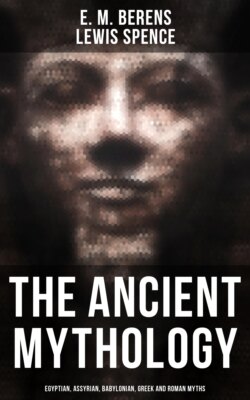Читать книгу The Ancient Mythology: Egyptian, Assyrian, Babylonian, Greek and Roman Myths - Lewis Spence - Страница 83
На сайте Литреса книга снята с продажи.
Ishtar's Love for Gilgamesh
ОглавлениеIn the VIth tablet, which relates the story of Ishtar's love for Gilgamesh, and the slaying of the sacred bull, victory again waits on the arms of the heroes, but here nevertheless we have the key to the misfortunes which later befall them. On his return to Erech after the destruction of Khumbaba, Gilgamesh was loudly acclaimed. Doffing the soiled and bloodstained garments he had worn during the battle, he robed himself as befitted a monarch and a conqueror. Ishtar beheld the King in his regal splendour, the flowers of victory still fresh on his brow, and her heart went out to him in love. In moving and seductive terms she besought him to be her bridegroom, promising that if he would enter her house "in the gloom of the cedar" all manner of good gifts should be his—his flocks and herds would increase, his horses and oxen would be without rival, the river Euphrates would kiss his feet, and kings and princes would bring tribute to him. But Gilgamesh, knowing something of the past history of this capricious goddess, rejected her advances with scorn, and began to revile her. He taunted her, too, with her treatment of former lovers—of Tammuz, the bridegroom of her youth, to whom she clung weepingly year after year; of Alalu the eagle; of a lion perfect in might and a horse glorious in battle; of the shepherd Tabulu and of Isullanu, the gardener of her father. All these she had mocked and ill-treated in cruel fashion, and Gilgamesh perceived that like treatment would be meted out to him should he accept the proffered love of the goddess. The deity was greatly enraged at the repulse, and mounted up to heaven: "Moreover Ishtar went before Anu (her father), before Anu she went and she (said): 'O my father, Gilgamesh has kept watch on me; Gilgamesh has counted my garlands, my garlands and my girdles.'" Underlying the story of Ishtar's love for Gilgamesh there is evidently a nature-myth of some sort, perhaps a spring-tide myth; Gilgamesh, the sun-god, or a hero who has taken over his attributes, is wooed by Ishtar, the goddess of fertility, the great mother-goddess who presides over spring vegetation. In the recital of her former love-affairs we find mention of the Tammuz myth, in which Ishtar slew her consort Tammuz, and other mythological fragments. It is possible also that there is an astrological significance in this part of the narrative.
